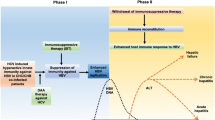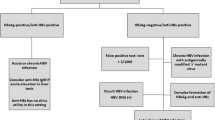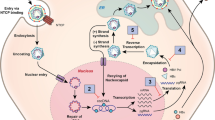Abstract
Purpose of Review
Acute hepatitis C infection is a growing concern in the USA, especially in light of the opioid epidemic. Prior treatment data consisted of trials in patients receiving interferon-based regimens. There is now emerging evidence regarding the safety and efficacy of direct-acting antivirals for the treatment of acute hepatitis C. This review summarizes the current evidence on the treatment of acute HCV in the DAA era.
Recent Findings
Certain populations, such as people who inject drugs, or HIV-positive men who have sex with men, may benefit from early treatment of acute HCV. As compared with chronic hepatitis C, shorter durations of treatment appear highly effective in acute infection, resulting in reduced viral transmission, as well as potentially reduced overall costs of care related to this disease.
Summary
Further studies are needed to clarify the optimal drug combinations and treatment durations to achieve sustained virologic response in these patients.

Similar content being viewed by others
References
Papers of particular interest, published recently, have been highlighted as: • Of importance •• Of major importance
Petruzziello A, Marigliano S, Loquercio G, Cozzolino A, Cacciapuoti C. Global epidemiology of hepatitis C virus infection: an up-date of the distribution and circulation of hepatitis C virus genotypes. World J Gastroenterol. 2016;22(34):7824–40. https://doi.org/10.3748/wjg.v22.i34.7824.
Mohd Hanafiah K, Groeger J, Flaxman AD, Wiersma ST. Global epidemiology of hepatitis C virus infection: new estimates of age-specific antibody to HCV seroprevalence. Hepatology. 2013;57(4):1333–42. https://doi.org/10.1002/hep.26141.
The Elimination of Hepatitis C. In: Buckley, GJ and Strom BL, editors. Eliminating the Public Health Problem of Hepatitis B and C in the United States: Phase One Report. 2016. National Academies Press: Washington, DC.
Centers for Disease Control and Prevention. Hepatitis C questions and answers for health professionals. 2018. https://www.cdc.gov/hepatitis/hcv/hcvfaq.htm#section1. Accessed 12/1/2018
Surveillance for viral hepatitis – United States, 2016. https://www.cdc.gov/hepatitis/statistics/2016surveillance/index.htm. Accessed 12/8/2018.
Suryaprasad AG, White JZ, Xu F, Eichler BA, Hamilton J, Patel A, et al. Emerging epidemic of hepatitis C virus infections among young nonurban persons who inject drugs in the United States, 2006-2012. Clin Infect Dis. 2014;59(10):1411–9. https://doi.org/10.1093/cid/ciu643.
Zibbell JE, Iqbal K, Patel RC, Suryaprasad A, Sanders KJ, Moore-Moravian L, et al. Increases in hepatitis C virus infection related to injection drug use among persons aged </=30 years - Kentucky, Tennessee, Virginia, and West Virginia, 2006-2012. MMWR Morb Mortal Wkly Rep. 2015;64(17):453–8.
Hajarizadeh B, Grebely J, Dore GJ. Case definitions for acute hepatitis C virus infection: a systematic review. J Hepatol. 2012;57(6):1349–60. https://doi.org/10.1016/j.jhep.2012.07.007.
Thomson EC, Nastouli E, Main J, Karayiannis P, Eliahoo J, Muir D, et al. Delayed anti-HCV antibody response in HIV-positive men acutely infected with HCV. AIDS. 2009;23(1):89–93. https://doi.org/10.1097/QAD.0b013e32831940a3.
Maasoumy B, Wedemeyer H. Natural history of acute and chronic hepatitis C. Best Pract Res Clin Gastroenterol. 2012;26(4):401–12. https://doi.org/10.1016/j.bpg.2012.09.009.
Thomson EC, Fleming VM, Main J, Klenerman P, Weber J, Eliahoo J, et al. Predicting spontaneous clearance of acute hepatitis C virus in a large cohort of HIV-1-infected men. Gut. 2011;60(6):837–45. https://doi.org/10.1136/gut.2010.217166.
• Micallef JM, Kaldor JM, Dore GJ. Spontaneous viral clearance following acute hepatitis C infection: a systematic review of longitudinal studies. J Viral Hepat. 2006;13(1):34–41. https://doi.org/10.1111/j.1365-2893.2005.00651.x A landmark systematic review that provides the estimates for spontaneous clearance of acute HCV and factors associated with clearance.
Grebely J, Page K, Sacks-Davis R, van der Loeff MS, Rice TM, Bruneau J, et al. The effects of female sex, viral genotype, and IL28B genotype on spontaneous clearance of acute hepatitis C virus infection. Hepatology. 2014;59(1):109–20. https://doi.org/10.1002/hep.26639.
Soriano V, Mocroft A, Rockstroh J, Ledergerber B, Knysz B, Chaplinskas S, et al. Spontaneous viral clearance, viral load, and genotype distribution of hepatitis C virus (HCV) in HIV-infected patients with anti-HCV antibodies in Europe. J Infect Dis. 2008;198(9):1337–44. https://doi.org/10.1086/592171.
Mangia A, Santoro R, Copetti M, Massari M, Piazzolla V, Spada E, et al. Treatment optimization and prediction of HCV clearance in patients with acute HCV infection. J Hepatol. 2013;59(2):221–8. https://doi.org/10.1016/j.jhep.2013.04.007.
Beinhardt S, Payer BA, Datz C, Strasser M, Maieron A, Dorn L, et al. A diagnostic score for the prediction of spontaneous resolution of acute hepatitis C virus infection. J Hepatol. 2013;59(5):972–7. https://doi.org/10.1016/j.jhep.2013.06.028.
Deterding K, Gruner N, Buggisch P, Wiegand J, Galle PR, Spengler U, et al. Delayed versus immediate treatment for patients with acute hepatitis C: a randomised controlled non-inferiority trial. Lancet Infect Dis. 2013;13(6):497–506. https://doi.org/10.1016/s1473-3099(13)70059-8.
Doyle JS, Deterding K, Grebely J, Wedemeyer H, Sacks-Davis R, Spelman T, et al. Response to treatment following recently acquired hepatitis C virus infection in a multicentre collaborative cohort. J Viral Hepat. 2015;22(12):1020–32. https://doi.org/10.1111/jvh.12429.
•• Bethea ED, Chen Q, Hur C, Chung RT, Chhatwal J. Should we treat acute hepatitis C? A decision and cost-effectiveness analysis. Hepatology. 2018;67(3):837–46. https://doi.org/10.1002/hep.29611 A study that developed a microsimulation model that showed treating acute HCV is cost-effective, and in some cases, cost-saving compared with deferred treatment.
AASLD/IDSA. Management of Acute HCV Infection. 2017. https://www.hcvguidelines.org/unique-populations/acute-infection. Accessed 12/8/2018 2018.
Kanzaki H, Takaki A, Yagi T, Ikeda F, Yasunaka T, Koike K, et al. A case of fulminant liver failure associated with hepatitis C virus. Clin J Gastroenterol. 2014;7(2):170–4. https://doi.org/10.1007/s12328-014-0454-x.
Tracy B, Shrestha R, Stein L, Bhasin D, Pollinger H, Rubin RA. Liver transplantation for fulminant genotype 2a/c hepatitis C virus marked by a rapid recurrence followed by cure. Transpl Infect Dis. 2017;19(3). https://doi.org/10.1111/tid.12690.
Levitsky J, Formica RN, Bloom RD, Charlton M, Curry M, Friedewald J, et al. The American Society of Transplantation Consensus Conference on the use of hepatitis C viremic donors in solid organ transplantation. Am J Transplant. 2017;17(11):2790–802. https://doi.org/10.1111/ajt.14381.
EASL. Recommendations on treatment of hepatitis C 2018. J Hepatol. 2018;69(2):461–511. https://doi.org/10.1016/j.jhep.2018.03.026.
Basu PP, Shah NJ, Aloysius MM, Brown RS Jr, editors. Sofosbuvir and ledipasvir versus sofosbuvir and simeprevir for acute hepatitis C: a RCT: SLAM C study. 25th Annual Conference of APASL. Tokyo: Hepatology International; 2016.
•• Deterding K, Spinner CD, Schott E, Welzel TM, Gerken G, Klinker H, et al. Ledipasvir plus sofosbuvir fixed-dose combination for 6 weeks in patients with acute hepatitis C virus genotype 1 monoinfection (HepNet Acute HCV IV): an open-label, single-arm, phase 2 study. Lancet Infect Dis. 2017;17(2):215–22. https://doi.org/10.1016/s1473-3099(16)30408-x A trial showing 100% SVR rate for 6 weeks of ledipasvir/sofosbuvir in genotype 1 acute HCV.
• Rockstroh JK, Bhagani S, Hyland RH, Yun C, Dvory-Sobol H, Zheng W, et al. Ledipasvir-sofosbuvir for 6 weeks to treat acute hepatitis C virus genotype 1 or 4 infection in patients with HIV coinfection: an open-label, single-arm trial. Lancet Gastroenterol Hepatol. 2017;2(5):347–53. https://doi.org/10.1016/s2468-1253(17)30003-1 A trial of ledipasvir/sofosbuvir for 6 weeks in patients with genotype 1 or 4 acute HCV coinfected with HIV; sub-optimal SVR rate seen in those with elevated baseline viral load.
•• Martinello M, Bhagani S, Gane E, Orkin C, Cooke G, Dore GJ, et al. Shortened therapy of eight weeks with paritaprevir/ritonavir/ombitasvir and dasabuvir is highly effective in people with recent HCV genotype 1 infection. J Viral Hepat. 2018;25(10):1180–8. https://doi.org/10.1111/jvh.12917 A trial that demonstrated a 97% SVR rate with 8 weeks of paritaprevir/ritonavir/ombitasvir plus dasabuvir (with ribavirin) in patients with recent HCV genotype 1 infection.
Author information
Authors and Affiliations
Corresponding author
Ethics declarations
Conflict of Interest
Robert S. Brown, Jr., reports grants and personal fees from Gilead, grants and personal fees from Abbvie, grants and personal fees from Merck, and grants and personal fees from BMS, outside the submitted work. Zurabi Lominadze declares no potential conflicts of interest.
Human and Animal Rights and Informed Consent
This article does not contain any studies with human or animal subjects performed by any of the authors.
Additional information
Publisher’s Note
Springer Nature remains neutral with regard to jurisdictional claims in published maps and institutional affiliations.
This article is part of the Topical Collection on Hepatitis C
Rights and permissions
About this article
Cite this article
Lominadze, Z., Brown, R.S. Acute HCV Treatment: What Should We Do in the DAA Era?. Curr Hepatology Rep 18, 216–221 (2019). https://doi.org/10.1007/s11901-019-00463-3
Published:
Issue Date:
DOI: https://doi.org/10.1007/s11901-019-00463-3




